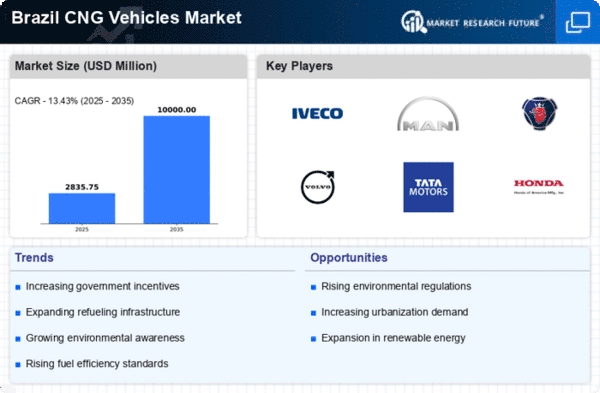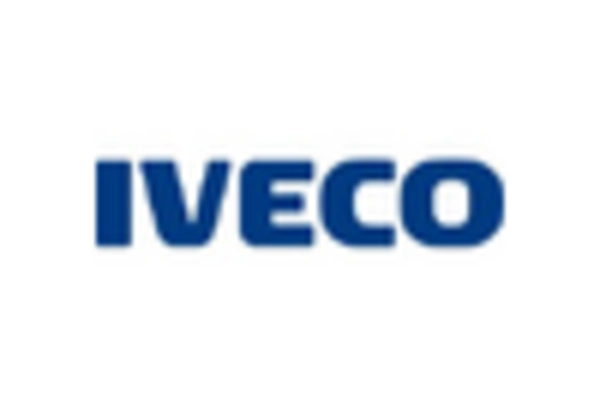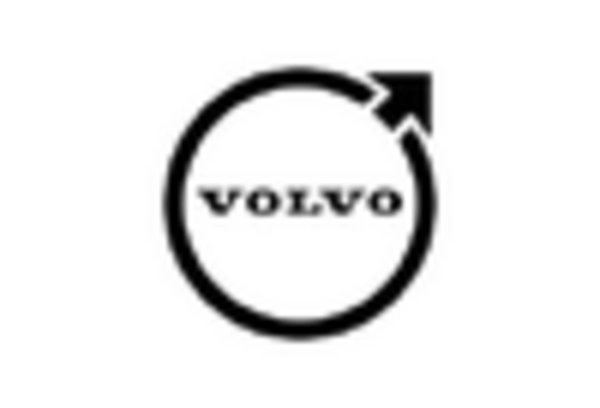Economic Viability of CNG
The economic advantages associated with CNG as a fuel source are propelling the cng vehicles market in Brazil. CNG is often more cost-effective than traditional fuels, leading to lower operational costs for vehicle owners. In Brazil, the price of CNG is approximately 30% lower than gasoline, making it an attractive option for both personal and commercial use. This economic viability is particularly appealing in urban areas where fuel costs can significantly impact transportation budgets. As the cost of living continues to rise, the demand for CNG vehicles is likely to increase, as consumers seek to minimize expenses. The cng vehicles market is thus positioned to benefit from this trend, as more individuals and businesses recognize the financial advantages of switching to CNG.
Public Awareness and Education
Increasing public awareness regarding the benefits of CNG is a crucial driver for the cng vehicles market in Brazil. Educational campaigns and outreach programs are being implemented to inform consumers about the environmental and economic benefits of CNG vehicles. As awareness grows, more potential buyers are likely to consider CNG as a viable alternative to conventional fuels. Surveys indicate that approximately 60% of Brazilian consumers are now aware of CNG vehicles and their advantages. This heightened awareness is expected to translate into increased sales and adoption rates, further stimulating the cng vehicles market. The ongoing efforts to educate the public about CNG's benefits could lead to a more informed consumer base, ultimately driving market growth.
Investment in Research and Development
Investment in research and development (R&D) is a pivotal factor influencing the cng vehicles market in Brazil. Automotive manufacturers are increasingly allocating resources to innovate and enhance CNG vehicle technology. This includes improving engine efficiency, reducing emissions, and developing more advanced fuel systems. In 2025, it is projected that R&D spending in the automotive sector could reach $500 million, with a significant portion directed towards CNG technologies. This investment is likely to yield advancements that make CNG vehicles more appealing to consumers, thereby expanding the market. As manufacturers strive to create more efficient and environmentally friendly vehicles, the cng vehicles market stands to benefit from these technological advancements.
Environmental Regulations and Compliance
The cng vehicles market in Brazil is significantly influenced by stringent environmental regulations aimed at reducing greenhouse gas emissions. The Brazilian government has implemented various policies that encourage the adoption of cleaner fuel alternatives, including compressed natural gas (CNG). As a result, manufacturers are increasingly focusing on producing CNG vehicles to comply with these regulations. The market is projected to grow as more consumers and businesses seek to align with environmental standards. In 2025, it is estimated that the demand for CNG vehicles could increase by approximately 15%, driven by these regulatory frameworks. This trend indicates a shift towards sustainable transportation solutions, positioning the cng vehicles market as a key player in Brazil's efforts to combat climate change.
Government Support for Infrastructure Development
Government initiatives aimed at enhancing CNG refueling infrastructure are crucial for the growth of the cng vehicles market in Brazil. The establishment of more refueling stations is essential to support the increasing number of CNG vehicles on the road. In recent years, the Brazilian government has committed to investing approximately $200 million in expanding the CNG refueling network. This investment is expected to facilitate greater accessibility for consumers, thereby encouraging the adoption of CNG vehicles. As the infrastructure improves, it is likely that more drivers will consider switching to CNG, further propelling the market's growth. The ongoing support for infrastructure development indicates a strong commitment to promoting cleaner fuel alternatives in Brazil.
















